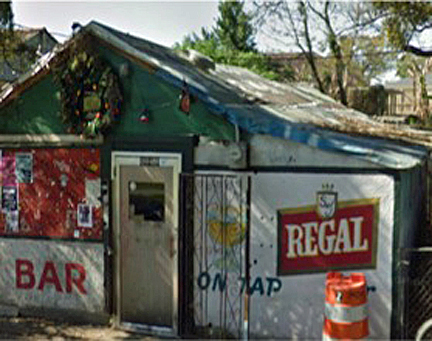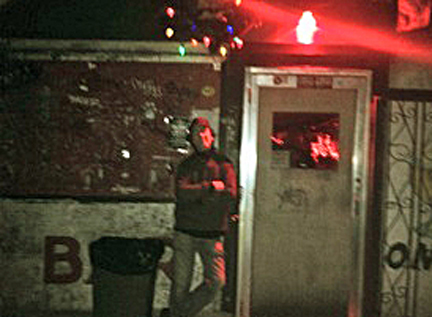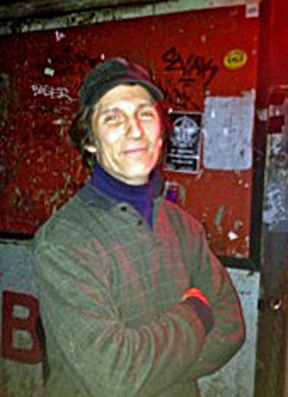By Marguerite Glover

Snake ‘n Jake’s Christmas Club bar: a local staple
“It was a fluke.”
New Orleans native David Clements, 60, speaks frankly about his bar.
Snake and Jake’s Christmas Club and Lounge is a staple of New Orleans culture. But Dave didn’t set out to make history, he says. It just sort of happened.
To those unfamiliar with it, Snake and Jake’s Christmas Club Lounge is a shack (literally) located Uptown at Oak and Hilary. The walls are covered in the most bizarre local trinkets imaginable. The lighting is so dim that even George Clooney could go unrecognized – in fact, he did once. The TV only works if the Saints are going to the Super Bowl. The Christmas lights are unevenly hung and old. The bathrooms narrate years of stories with unmonitored graffiti.
Snake and Jake’s is considered by some to be the best bar in the world.
Owning a bar was never a serious business prospect for Dave. He and his friend Robert occasionally kicked around the idea of opening a bar dedicated to “late night, total drunken debauchery.”
Everything happened on a whim when Dave spotted the “For Sale” sign outside a dilapidated bar right across the street from where he once lived.
He hit the brakes and asked a neighbor the asking price. The response? “Cheap.”

David Clements opened Snake ‘n Jake’s in 1994.
Broke but resourceful, Dave eventually procured funding from a friend, who was willing to put up only half the asking price. Doubtful but never one to miss an opportunity, Dave made the offer, and, to his surprise, it was accepted.
When asked how that felt, Dave replied with the same astonishment he felt 20 years ago: “Wow, I own a bar!” Little did he know at the time, but it quickly would become much more than just that.
According to Dave, the bar originally had been called S + J Lounge after the owners, “Snake” (Richard) and Jake. Before that it had been called The Christmas Lounge. When Dave purchased the building, both signs were still on the door and the name stuck.
“It’s the best name on the planet,” Dave said almost wistfully. “Snake and Jake’s Christmas Club Lounge. Rolls right off the tongue.”
The bar opened in 1994 to initial success. “Within a year or so it was insanity, like Mardi Gras here every night. Nuts.”
A bartender named Frank was responsible for much of the bar’s popularity among the late-night crowd, due to his habit of bringing back musicians for a drink after shows. Word about Snake and Jake’s got out quickly, and soon musicians, locals, and service industry laborers had found their late-night haven.

‘Within a year or so it was insanity, like Mardi Gras here every night,’ says Clements.
One can imagine how a bar with such a distinct atmosphere might attract some negative attention. Especially from residents of Uptown New Orleans who wanted to live in a quiet neighborhood, not next door to a bar whose owner once planned to award sunglasses to its early-morning patrons. (The idea never came into fruition. Dave ordered the glasses online, but says they arrived looking quite ridiculous.)
When asked about those early complaints, Dave throws back his head and rolls his eyes. “We were listed as the ‘top local nuisance bar.’ The city and some of these residents wanted us out.”
Snake and Jake’s reputation grew exponentially when chef Anthony Bourdain was asked to name the craziest thing that has ever happened to him in New Orleans. He replied, “I don’t know. But it probably happened at Snake and Jake’s.”
Many things make Snake and Jake’s different from the usual corner bar. Dave knows his bar is special, but doesn’t brag about it. He never planned for Anthony Bourdian to publicly endorse the place, for the Rolling Stones to list it as their favorite bar, the New york Times to include it in its New orleans travel guide, or for it to be ranked one of the top dive bars in the country year after year.
“I knew we were onto something,” Dave says simply, when asked about the bar’s success. “I kind of felt obligated to keep it going, even if I didn’t make any money, because I think its such a unique place.”
There’s something charming about a man whose bar you could easily mistake for a trailer. Some of that charm is inherent, but there were some defining moments in his early years that shaped the Dave Clements of today.
As a teenager, Dave was an energetic pro-civil rights activist – not an easy feat for a white boy in southern Louisiana. When a group of black students at his high school were denied the right to a student union, Dave and his brother joined the protest. They and 70 or so others were suspended. When the suspension ended, Dave recalls, the school called him in for re-evaluation, asking, “What would you do if an incident like this happened again?” Dave replied he would do the exact same thing, and, he says, was subsequently kicked out of the public school system. He says he has no regrets.
During the draft for the Vietnam War, Dave contines, his number was called early on and he knew he would likely be serving on the front lines of battle. So he took a friend’s advice, he says, and visited a doctor, leaving with a sufficient medical excuse from the battle. His ailments? “I told him I was gay, addicted to LSD, and had a fear of crowds.”
A born raconteur, Dave has a favorite story that sums up his patrons’ loyalty. Several years ago, he says, two gunmen came in and robbed the bar, firing two warning shots on the way out. One shot hit a girl in the foot; the other went through a boy’s arm and lodged in his girlfriend’s hand. Dave got a call that he needed to get to the b ar there immediately. The media was everywhere, writing headlines like “shooting at local nuisance bar.” Stammering through interviews, Dave knew he was in big trouble. Until the girl who had been shot in the foot appeared on crutches, proclaiming, “You can’t stop me from drinking at my favorite bar!” and went right back in. The headlines changed: “Shooting incident can’t keep locals away from favorite bar.”
Dave loves all his patrons, even the college kids that other bars avoid.
“I love ‘em. Youthful and energetic. I think young kids are great, not because they come to my business, but because I like their energy.”
“I don’t know what it is about the bar, but something connects people here,” Dave says. “I’ll look around at 2 in the morning and see the hub of conversation and people laughing, and notice some wild connection that is inexplicable.
“Not to put this in teenage boy terminology, but I kind of feel like this is someone’s basement. You come in and have fun and someone else has to clean it up. It’s a magical place than the rest of the world, or at least it has that effect on people.”
This article by Margeurite Glover is published as part of a service learning partnership between NolaVie and the students of Dr. Diane Grams’ sociology classes at Tulane University.
 NOLAbeings Multimedia artist Claire Bangser created NOLAbeings as a portrait-based story project that marries...
NOLAbeings Multimedia artist Claire Bangser created NOLAbeings as a portrait-based story project that marries...  Voodoo in New Orleans: Reviving history: New Orleans fortune telling This article takes a deep dive into the history of Voodoo in New Orleans, its hybridization with Catholicism, and its present-day place in the city's culture. The author visits fortune-tellers in the French Quarter, using their guidance as a tool for introspection rather than a deterministic predictor of the future. Through her experiences in New Orleans, the author feels a mystical connection to both the past and the future.
Voodoo in New Orleans: Reviving history: New Orleans fortune telling This article takes a deep dive into the history of Voodoo in New Orleans, its hybridization with Catholicism, and its present-day place in the city's culture. The author visits fortune-tellers in the French Quarter, using their guidance as a tool for introspection rather than a deterministic predictor of the future. Through her experiences in New Orleans, the author feels a mystical connection to both the past and the future. 